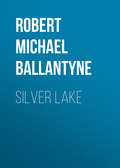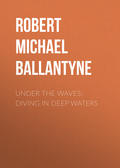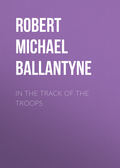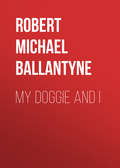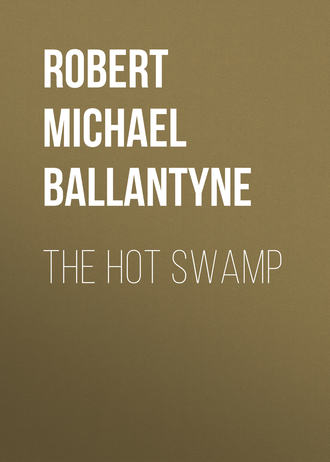
Robert Michael Ballantyne
The Hot Swamp
Chapter Twenty Two
The Pigs’ Cure
It was not long before our hero recovered from his delirium. Leading, as he had been doing, an abstemious and healthy life, ordinary disease could not long maintain its grasp of him. His superabundant life seemed to cast it off with the ease with which his physical frame was able to cast aside human foes. But he could not thus shake off the leprosy.
One of the first things he did on recovering consciousness was to uncover his arm. The fatal spot had increased considerably in size. With something of a shudder he looked round his little hut, endeavouring to remember where he was and to recall recent events. He was alone at the time, and he fancied the fight with the robbers and rescue of the boy must have been all a dream. The name Cormac, however, puzzled him not a little. Many a time before that had he dreamed of vivid scenes and thrilling incidents, but never in his recollection had he dreamt a name!
Being thoughtfully disposed, he lay meditating listlessly on this point in that tranquil frame of mind which often accompanies convalescence, and had almost fallen asleep when a slight noise outside awoke him. The curtain-door was lifted, and Cormac, entering, sat quietly down on a block of wood beside him.
Bladud became suddenly aware that he had not been dreaming, but he did not move. Through his slightly opened eyelids he watched the lad while he mixed some berries in a cup of water. As he lay thus silently observant, he was deeply impressed with the handsome countenance of his nurse and the graceful movements of his slight figure.
Presently the thought of his disease recurred to him—it was seldom, indeed, absent from his mind—and the strict injunctions which he had given to his young companion.
“Boy!—boy!” he cried suddenly, with a vigour that caused the boy to start off his seat and almost capsize the cup, “did I not forbid you to enter my hut or to touch me?”
At first Cormac looked alarmed, but, seeing that a decided change for the better had taken place in his patient, his brow smoothed and he laughed softly.
“How dared you to disobey me?” exclaimed Bladud again in stern tones.
“I dared because I saw you were unable to prevent me,” returned the lad, with a quiet smile. “Besides, you were too ill to feed yourself, so, of course, I had to do it for you. Do you suppose I am so ungrateful to the man who saved my life as to stand aside and let him die for want of a helping hand? Come, now, be reasonable and let me give you this drink.” He approached as he spoke.
“Keep off!—keep off, I say,” shouted the prince in a voice so resolute that Cormac was fain to obey. “It is bad enough to come into my hut, but you must not touch me!”
“Why not?—I have touched you already.”
“How! when?”
“I have lifted your head many a time to enable you to drink when you could not lift it yourself.”
A groan escaped Bladud.
“Then it is too late! Look at this,” he cried, suddenly uncovering his arm.
“What is that?” asked the boy, with a look of curiosity.
“It is—leprosy!”
“I am not afraid of leprosy!”
“Not afraid of it!” exclaimed the prince, “that may well be, for you have the air of one who fears nothing; but it will kill you for all that, unless the Maker of all defends you, for it is a dread—a terrible—disease that no strength can resist or youth throw off. It undermines the health and eats the flesh off the bones, renders those whom it attacks horrible to look at, and in the end it kills them. But it is possible that you may not yet have caught the infection, poor lad, so you must keep away from me now, and let not a finger touch me henceforth. Your life, I say, may depend on it.”
“I will obey you as to that,” replied Cormac, “now that you are beginning to recover, but I must still continue to put food and water within your reach.”
“Be it so,” rejoined the prince, turning away with a slight groan, for his excitement not less than the conversation had exhausted him. In a few minutes more he was asleep with an expression of profound anxiety stereotyped on his countenance.
It was not long after the fever left him that returning strength enabled Bladud to crawl out of his hut, and soon after that he was able to ramble through the woods in company with Cormac, and with Brownie—that faithful friend who had lain by his master’s side during all his illness. The sparkling river gladdened the eyes, and the bracing air and sunshine strengthened the frame of the prince, so that with the cheerful conversation of Cormac and the gambols of his canine friend he was sometimes led to forget for a time the dark cloud that hung over him.
One day he was struck by something in the appearance of his dog, and, sitting down on a bank, he called it to him. After a few minutes’ careful examination he turned to Cormac with a look of deep anxiety.
“My boy,” he said, “I verily believe that the hound is smitten with my own complaint. In his faithful kindness he has kept by me until I have infected him.”
“That cannot be,” returned Cormac, “for, during my rambles alone, when you were too ill to move, I saw that a great many of the pigs were affected by a skin disease something like that on the dog, and, you know, you could not have infected the pigs, for you have never touched them.”
Bladud’s anxiety was not removed but deepened when he heard this, for he called to remembrance the occasion when he had rescued one of the little pigs and carried it for some distance in his arms.
“And, do you know,” continued the lad, “I have observed a strange thing. I have seen that many of the pigs, affected with this complaint, have gone down to the place where the hot waters rise, and, after bathing there, have returned all covered with mud, and these pigs seem to have got better of the disease, while many of those which did not go down to the swamp have died.”
“That is strange indeed,” returned the prince; “I must see to this, for if these waters cure the pigs, why not the dog?”
“Ay,” rejoined Cormac, “and why not the man?”
“Because my disease is well known to be incurable.”
“Are you sure?”
“We can hardly be sure of anything, not even of killing our mid-day meal,” rejoined the prince. “See, there goes a bird that is big enough to do for both of us. Try your hand.”
“That will be but losing an opportunity, for, as you know, I am not a good marksman,” returned the youth, fitting an arrow quickly to his bow nevertheless, and discharging it. Although the bird in question was large and not far off, the arrow missed the mark, but startled the bird so that it took wing. Before it had risen a yard from the ground, however, an arrow from Bladud’s bow transfixed it.
That night, after the bird had been eaten, when Brownie was busy with the scraps, and Cormac had retired to his couch in the firewood booth, Bladud lay in his hut unable to sleep because of what he had heard and seen that day. “Hope springs eternal in the human breast”—not less in the olden time than now. At all events it welled up in the breast of the royal outcast with unusual power as he waited anxiously for the first dawn of day.
Up to this time, although living within a few miles of it, the prince had not paid more than one or two visits to the Hot Swamp, because birds and other game did not seem to inhabit the place, and the ground was difficult to traverse. He had, of course, speculated a good deal as to the cause of the springs, but had not come to any conclusions more satisfactory than have been arrived at by the scientific minds of modern days. That heat of some sort was the cause applied in one fashion or another to the water so as to make it almost boil he had no manner of doubt, but what caused the heat he could not imagine, and it certainly did not occur to him that the interior of the earth was a lake of fire—the lovely world of vision being a mere crust. At least, if it did, he was never heard to say so.
But now he went down to the swamp with a renewed feeling of hope that gave fresh impulse to his heart and elasticity to his tread.
Arrived at the place, he observed that numbers of his porcine family were there before him. On seeing him they retreated with indignant grunts—their hasty retreat being accelerated by a few remarks from Brownie.
Making his way to what he believed to be the main fountain of the spring, the prince and the dog stood contemplating it for some time. Then the former dipped his hand in, but instantly withdrew it, for he found the water to be unbearably hot. Following its course, however, and testing it as he went along, he soon came to a spot where the temperature was sufficiently cool to render it agreeable. Here, finding a convenient hole big enough to hold him, he stripped and bathed. Brownie, who seemed much interested and enlivened by his master’s proceedings, joined him on invitation, and appeared to enjoy himself greatly. Thereafter they returned home to breakfast and found Cormac already up and roasting venison ribs before the fire.
“I thought you were still sound asleep in your hut,” he said in surprise, as they came up, “and I have been doing my best to make little noise, for fear of awaking you. Have you been bathing at the springs? I see the hound’s coat is muddy.”
“Thanks for your care, Cormac. Ay, we have indeed had a bath—Brownie and I. You see I have taken your advice, and am trying the pigs’ cure.”
“Right, Bladud. Wiser men have learned lessons from pigs.”
“Are you not presumptuous, my lad, to suggest that there may be a wiser man than I?”
“Truly, no, for taking the advice of a mere stripling like me, is not a sign of wisdom in a man.”
“In the present case you are perhaps right, but there are some striplings whose wisdom is sufficient to guide men. However, I will hope that even you, with all your presumption, may be right this time.”
“That encourages me to offer additional advice,” retorted the lad with a laugh, “namely, that you should devote your attention to these ribs, for you will find them excellent, and even a full-grown man can hardly fail to know that without food no cure can be effected.”
“You are right, my boy. Sit down and set me an example, for youth, not less than age, must be supported.”
Without more words they set to work, first throwing a bone to the hound, in order, as Bladud remarked, that they might all start on equal terms.
From that day the health of the prince began to mend—slowly but steadily the spot on his arm also began to diminish and to assume a more healthy aspect. Brownie also became convalescent, and much to the joy of Bladud, Cormac showed no symptoms of having caught the disease. Still, as a precaution, they kept studiously apart, and the prince observed—and twitted the boy with the fact—that the more he gained in health, and the less danger there was of infection, the more anxious did he seem to be to keep away from him!
Things were in this state when, one evening, they received a visit—which claims a new chapter to itself.
Chapter Twenty Three
In which very Perplexing Events Occur
The visitor referred to in the last chapter was a tall, broad-shouldered old man with a snowy head of hair and a flowing white beard, a long, loose black garment, and a stout staff about six feet long.
Cormac had gone to a spring for water at the time he arrived, and Bladud was lying on his back inside his hut.
“Is any one within?” demanded the stranger, lifting a corner of the curtain.
“Enter not here, whoever you are!” replied the prince quickly, springing up—“stay—I will come out to you.”
“You are wonderfully inhospitable,” returned the stranger, as the prince issued from the hut and stood up with an inquiring look which suddenly changed to one of astonishment.
“Beniah!” he exclaimed.
“Even so,” replied the Hebrew, holding out his hand, but Bladud drew back.
“What! will you neither permit me to enter your house nor shake your hand? I was not so churlish when you visited my dwelling.”
“You know well, old man, that I do not grudge hospitality, but fear to infect you.”
“Yes, I know it well,” rejoined the Hebrew, smiling, “and knowing that you were here, I turned aside on my journey to inquire as to your welfare.”
“I have much to say about my welfare and strange things to tell you, but first let me know what has brought you to this part of the land—for if you have turned aside to see me—seeing me has not been your main object.”
“You are right. Yet it pleases me well to use this opportunity, and to see by your looks and bearing, that the disease seems to have been arrested.”
“Yes, thanks be to the All-seeing One, I am well, or nearly so. But proceed to explain the reason of your journey.”
“The cause of it is the unaccountable disappearance of the girl named Branwen.”
“What! she who is the bosom friend of my sister Hafrydda?”
“The same. She had fled, you may remember, from your father’s court for fear of being compelled to wed with Gunrig, the chief whose crown you cracked so deftly on the day of your arrival. She, poor thing, took refuge at first with me. I hid her for some time—”
“Then,” interrupted the prince, “she must have been hidden in your hut at the time of my visit!”
“She was. But that was no business of yours.”
“Surely it was, old man, for my father’s business is my business.”
“Yea, but it was not my business to enlighten you, or the king either, while I had reason to know that he meant unduly to coerce the maiden. However, there she was hidden, as I tell you. Now, you are aware that Branwen’s father Gadarn is a great chief, whose people live far away in the northern part of Albion. I bade Branwen remain close in my hut, in a secret chamber, while I should go and acquaint her father with her position, and fetch him down with a strong band of his retainers to rescue her. You should have seen the visage of Gadarn, when I told him the news. A wild boar of the woods could scarce have shown his tusks more fiercely. He not only ordered an armed band to get ready, instantly, but he roused the whole country around, and started off that same day with all his followers armed to the teeth. Of course I led them. In due course we arrived at my hut, when—lo! I found that the bird was flown!”
“I could see by the appearance of things,” continued the Hebrew, “that the foolish girl had left of her own will, for there was no evidence of violence anywhere—which would doubtless have been the case if robbers had found her and carried her away, for they would certainly have carried off some of my goods along with her. The rage of her father on making this discovery was terrible. He threatened at once to cut off my old head, and even drew his sword with intent to act the part of executioner. But I reminded him that if he did so, he would cut off the only head that knew anything about his daughter, and that I had still some knowledge regarding her with which he was not acquainted.
“This arrested his hand just in time, for I actually fancied that I had begun to feel the edge of his sword slicing into my spinal marrow. When he had calmed himself enough to listen, I told him that Branwen had spoken about paying a visit to the Hot Springs—that I knew she was bent on going there, for some reason that I could not understand, and that I thought it more than likely she had gone. ‘Axe-men, to the front! Form long line! hooroo!’ yelled the chief—(or something of that sort, for I’m a man of peace, and don’t understand warlike orders), and away went the whole host at a run, winding through the forest like a great snake; Gadarn and I leading them, except when the thickets became impenetrable, and then the axe-men were ordered to the front and soon broke them down. And so, in course of time, we came within a few miles of the Hot Swamp, and—and, as I have said, I have been permitted to turn aside to visit you.”
“Truly a strange tale,” remarked the prince. “And is the armed host of Gadarn actually within a few miles of us?”
“It is; and, to say truth, I have come out to search for you chiefly to inquire whether you have seen any young woman at all resembling Branwen during your wanderings in this region?”
The Hebrew looked keenly at the prince as he put this question.
“You forget I have never seen this girl, and, therefore, could not know her even if I had met her. But, in truth, I have not seen any woman, young or old, since I came here. Nor have I seen any human being save my mad master, Konar, and a poor youth whom I rescued some time ago from the hands of robbers. He has nursed me through a severe illness, and is even now with me. But what makes you think that Branwen intended to come to the Swamp?”
“Because—because, she had reasons of her own. I do not profess to understand the workings of a young girl’s mind,” answered the Hebrew.
“And what will you do,” said Bladud, “now that you find she has not been here? Methinks that when Gadarn hears of your failure to find her at the Swamp, your spinal marrow and his sword will still stand a good chance of becoming acquainted.”
The Hebrew looked perplexed, but, before he could answer, Brownie came bounding gaily round the corner of the hut. Seeing a stranger, he stopped suddenly, displayed his teeth and growled.
“Down, pup! He is not accustomed to visitors, you see,” said his master apologetically.
At that moment Cormac turned the corner of the hut, bearing an earthen jar of water on his shoulder. His eyes opened wide with surprise, so did those of the Hebrew, and the jar dropped to the ground, where it broke, and Brownie, quick to see and seize his opportunity, began to lap its contents. The prince—also wide-eyed—gazed from one to the other. It was a grand tableau vivant!
The first to recover himself and break the spell was Cormac. Leaping forward, he grasped the old man by the hand, and turning so as to present his back to Bladud, gave the Hebrew a look so powerfully significant that that son of Israel was quite disconcerted.
“My old, kind friend—is it—can it—be really yourself? So far from home—so unexpected! It makes me so glad to see you,” said the youth. Then, turning to Bladud, “A very old friend of mine, who helped me once in a time of great distress. I am so rejoiced, for now he will guide me back to my own home. You know I have sometimes talked of leaving you lately, Bladud.”
“You say truth, my young friend. Frequently of late, since I have been getting well, you have hinted at a wish to go home, though you have not yet made it clear to me where that home is; and sad will be the day when you quit me. I verily believe that I should have died outright, Beniah, but for the kind care of this amiable lad. But it is selfish of me to wish you to stay—especially now that you have found a friend who, it would seem, is both able and willing to guard you through the woods in safety. Yet, now I think, my complaint is so nearly cured that I might venture to do that myself.”
“Not so,” returned the lad, quickly. “You are far from cured yet. To give up using the waters at this stage of the cure would be fatal. It would perhaps let the disease come back as bad as before.”
“Nay, but the difficulty lies here,” returned the prince, smiling at the boy’s eagerness. “This good old man is at present engaged as guide to an army, and dare not leave his post. A foolish girl named Branwen fled some time ago from my father’s house, intending, it is supposed, to go to some friends living not far from the Hot Swamp. They have been searching for her in all directions, and at last her father, with a host at his heels, has been led to within a few miles of this place, but the girl has not yet been discovered; so the search will doubtless be continued.”
“Is that so?” asked Cormac of the Hebrew, pointedly.
“It is so.”
“What is the name of the chief whose daughter has been so foolish as to run away from her friends?”
“Gadarn,” answered Beniah.
“Oh! I know him!” exclaimed Cormac in some excitement, “and I know many of his people. I lived with them once, long, long ago. How far off is the camp, did you say?”
“An hour’s walk or so.”
“In that direction?” asked Cormac, pointing.
“Yes, in that direction.”
“Then I will go and see them,” said the lad, picking up his bow and arrows. “You can wait here till I come back, Beniah, and keep Bladud company—for he is accustomed to company now! Who knows but I may pick up this foolish girl on my way to the camp!”
The lad hurried into the woods without waiting a reply; but he had not gone a hundred yards when he turned and shouted, “Hi, Beniah!” at the same time beckoning with his hand.
The Hebrew hurried towards him.
“Beniah,” said the lad impressively, as he drew near, “go back and examine Bladud’s arm and let me know when we meet again what you think of it.”
“But how—why—wherefore came you—?” exclaimed the Hebrew, pausing in perplexity.
“Ask no questions, old man,” returned the youth with a laugh. “There is no time to explain—. He will suspect—robbers—old mother—bad son—escape—boy’s dress—fill up that story if you can! More hereafter. But—observe, if you say one word about me to anybody, Gadarn’s sword is sharp and his arm strong! You promise?”
“I promise.”
“Solemnly—on your word as a Hebrew?”
“Solemnly—on my word as a Hebrew. But—?”
With another laugh the boy interrupted him, turned, and disappeared in the woods.
“A strange, though a good and affectionate boy,” remarked Bladud when the Hebrew returned. “What said he?”
“He bade me examine your arm, and tell him what I think of it on his return.”
“That is of a piece with all the dear boy’s conduct,” returned the prince. “You have no idea what a kind nurse he has been to me, at a time when I was helpless with fever. Indeed, if I had not been helpless and delirious, I would not have allowed him to come near me. You have known him before, it seems?”
“Yes; I have known him for some time.”
From this point the prince pushed the Hebrew with questions, which the latter—bearing in remembrance the sharpness of Gadarn’s sword, and the solemnity of his promise—did his best to evade, and eventually succeeded in turning the conversation by questioning Bladud as to his intercourse with the hunter of the Swamp, and his mode of life since his arrival in that region. Then he proceeded to examine the arm critically.
“It is a wonderful cure,” he said, after a minute inspection. “Almost miraculous.”
“Cure!” exclaimed the prince. “Do you, then, think me cured?”
“Indeed I do—at least, very nearly so. I have had some experience of your complaint in the East, and it seems to me that a perfect cure is at most certain—if it has not been already effected.”




